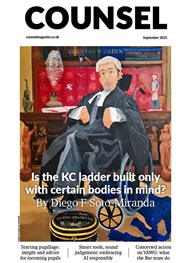*/
THE Chief Executive of the Bar Council of England and Wales, the Chairman of the Bar Human Rights Committee of England and Wales and the President of the Law Society of England and Wales expressed their deep concern at reports of mass trials being held in Iran following the political unrest after the disputed June presidential elections. The fourth mass trial in Tehran’s Revolutionary Court began yesterday where over 100 people have been accused of crimes including rioting, vandalism, “acting against national security”, and conspiring against the ruling system. Those on trial include members of the opposition reform movement, including a former vice-president and other senior politicians. Two Iranian workers for the British and French embassies in Tehran, a French academic and an
Iranian-Canadian reporter were also among those on trial.
This is the latest in a series of moves which threatens to undermine Iran’s credibility for upholding international standards for the rule of law and fair trial procedures. Reports indicate that lawyers representing the defendants have been denied access to their clients, to prosecution case documents and to knowledge of the dates of the trials. If these allegations are true, Iran is failing to meet their international obligations under the International Covenant for Civil and Political Rights1 . In particular, defendants have a right to an adequate defence. This includes not only the right to be assisted by a lawyer, but also to have all the elements of evidence at one’s disposal, including access to case materials. This right constitutes one of the most fundamental elements of a fair trial. In the interests of justice, the accused is entitled to the minimum guarantees of legal representation. The signatories to this statement ask the Iranian authorities to abide by their government’s commitment to the rule of law and fair trial procedures. Any trials that take place in Iran must ensure that defendants are guaranteed their fundamental rights. The signatories urge the Iranian authorities to put an end to these trials and release those who have been imprisoned arbitrarily without charge of a specific criminal offence.
This is the latest in a series of moves which threatens to undermine Iran’s credibility for upholding international standards for the rule of law and fair trial procedures. Reports indicate that lawyers representing the defendants have been denied access to their clients, to prosecution case documents and to knowledge of the dates of the trials. If these allegations are true, Iran is failing to meet their international obligations under the International Covenant for Civil and Political Rights1 . In particular, defendants have a right to an adequate defence. This includes not only the right to be assisted by a lawyer, but also to have all the elements of evidence at one’s disposal, including access to case materials. This right constitutes one of the most fundamental elements of a fair trial. In the interests of justice, the accused is entitled to the minimum guarantees of legal representation. The signatories to this statement ask the Iranian authorities to abide by their government’s commitment to the rule of law and fair trial procedures. Any trials that take place in Iran must ensure that defendants are guaranteed their fundamental rights. The signatories urge the Iranian authorities to put an end to these trials and release those who have been imprisoned arbitrarily without charge of a specific criminal offence.
THE Chief Executive of the Bar Council of England and Wales, the Chairman of the Bar Human Rights Committee of England and Wales and the President of the Law Society of England and Wales expressed their deep concern at reports of mass trials being held in Iran following the political unrest after the disputed June presidential elections. The fourth mass trial in Tehran’s Revolutionary Court began yesterday where over 100 people have been accused of crimes including rioting, vandalism, “acting against national security”, and conspiring against the ruling system. Those on trial include members of the opposition reform movement, including a former vice-president and other senior politicians. Two Iranian workers for the British and French embassies in Tehran, a French academic and an
Iranian-Canadian reporter were also among those on trial.


Chair of the Bar sets out a busy calendar for the rest of the year
By Louise Crush of Westgate Wealth Management
Examined by Marie Law, Director of Toxicology at AlphaBiolabs
Time is precious for barristers. Every moment spent chasing paperwork, organising diaries, or managing admin is time taken away from what matters most: preparation, advocacy and your clients. That’s where Eden Assistants step in
AlphaBiolabs has announced its latest Giving Back donation to RAY Ceredigion, a grassroots West Wales charity that provides play, learning and community opportunities for families across Ceredigion County
Rachel Davenport, Co-founder and Director at AlphaBiolabs, outlines why barristers, solicitors, judges, social workers and local authorities across the UK trust AlphaBiolabs for court-admissible testing
Through small but meaningful efforts, we can restore the sense of collegiality that has been so sorely eroded, says Baldip Singh
Come in with your eyes open, but don’t let fear cloud the prospect. A view from practice by John Dove
Looking to develop a specialist practice? Mariya Peykova discusses the benefits of secondments and her placement at the Information Commissioner’s Office
Anon Academic explains why he’s leaving the world of English literature for the Bar – after all, the two are not as far apart as they may first seem...
Review by Stephen Cragg KC